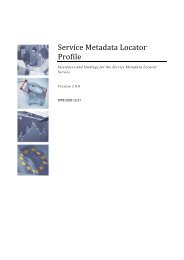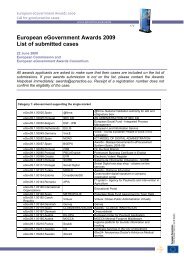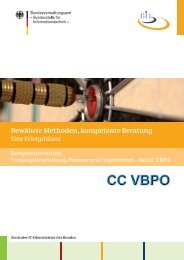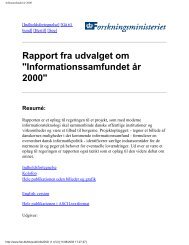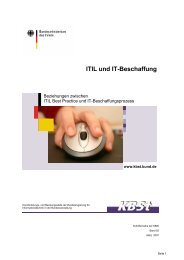Comparative Study of Public e-Service Centres in - ePractice.eu
Comparative Study of Public e-Service Centres in - ePractice.eu
Comparative Study of Public e-Service Centres in - ePractice.eu
You also want an ePaper? Increase the reach of your titles
YUMPU automatically turns print PDFs into web optimized ePapers that Google loves.
PUBLIC E-SERVICE CENTRES IN EUROPE<br />
helpdesk service, a constant dynamisation <strong>of</strong> the network, the creation <strong>of</strong> technical guidel<strong>in</strong>es<br />
for the d<strong>in</strong>amitzadors, the formation <strong>of</strong> the "dynamizadores" through e-learn<strong>in</strong>g platforms. We<br />
have also created with the UOC 34 a master for the "d<strong>in</strong>amitzadors" <strong>of</strong> the network and we do<br />
also take care to develop tra<strong>in</strong><strong>in</strong>g tools for the users <strong>of</strong> the telecentres".<br />
"Unlike other networks <strong>in</strong> Spa<strong>in</strong> that directly manage their network and have a more uniform<br />
policy, we have several pr<strong>of</strong>iles <strong>of</strong> workers <strong>in</strong>side the network, for example the dynamitzadors<br />
from the Onmia network are employees <strong>of</strong> the Generalitat, but others have different<br />
agreements with the local entities they work for"<br />
Technological issue:<br />
S<strong>in</strong>ce 2005, we have created a "demo or beta stage" network <strong>of</strong> 28 telecentres that only work<br />
with free s<strong>of</strong>tware; we distributed them all over the Catalan territory, select<strong>in</strong>g places where<br />
there was already an <strong>in</strong>terest and sensitivity towards this issue. We are test<strong>in</strong>g a system<br />
called client-server, "stupid screens" they call it, where all computers are connected to one<br />
s<strong>in</strong>gle server, it can be a very economic and easy to ma<strong>in</strong>ta<strong>in</strong> solution. Furthermore the<br />
s<strong>of</strong>tware package is <strong>in</strong> Catalan and can be adapted to local needs and specificities; it was<br />
used <strong>in</strong>itially as a demo test which was f<strong>in</strong>alised last October. We are now develop<strong>in</strong>g an<br />
evaluation to see its use possibilities <strong>in</strong> other places.<br />
The basic problems we encountered were one <strong>of</strong> acceptance by the local entities, and we<br />
have <strong>of</strong> course to help them to migrate from proprietary s<strong>of</strong>tware to open source. There<br />
doesn't seem to be any problem for users hav<strong>in</strong>g their first contact with ICTs, and <strong>in</strong>ternet,<br />
they don't even see it is different, it is the same to beg<strong>in</strong> from there or from the traditional<br />
operative systems environment. The problem comes when people come to the telecentres<br />
look<strong>in</strong>g for a more pr<strong>of</strong>essional tra<strong>in</strong><strong>in</strong>g, if they want to get tra<strong>in</strong>ed on tools that they can use<br />
and apply <strong>in</strong> their labour environment, there might be a problem. At the same time and <strong>in</strong><br />
theory telecentres were developed and are oriented towards people who have basic levels <strong>of</strong><br />
digital literacy and ICT skills.<br />
For more specialized networks like the "telework<strong>in</strong>g network" it is clear that we need both<br />
platforms, proprietary and open source so we can achieve more pr<strong>of</strong>essional tra<strong>in</strong><strong>in</strong>g and<br />
basic skills also"<br />
"We opted for free s<strong>of</strong>tware because a lot <strong>of</strong> people are develop<strong>in</strong>g applications and shar<strong>in</strong>g<br />
them, it is based on a philosophy <strong>of</strong> work<strong>in</strong>g <strong>in</strong> network, it can also provide more <strong>in</strong>ventive<br />
solutions for local bus<strong>in</strong>esses, adapt<strong>in</strong>g also to local language, but also to Arab or Ch<strong>in</strong>ese for<br />
teachers who have to teach the newly arrived people from third countries"<br />
Formation for "d<strong>in</strong>amitzadors":<br />
"They use a e-learn<strong>in</strong>g distance platform based on a CMS called Moodle, they are very<br />
confident and comfortable with it. We try to detect their needs as they emerge and we<br />
organize tra<strong>in</strong><strong>in</strong>g modules us<strong>in</strong>g the moodle. A real problem for us is the high staff turn over <strong>of</strong><br />
d<strong>in</strong>amitzadors. When telecentres close or if a d<strong>in</strong>amitzador leaves for another job or tra<strong>in</strong><strong>in</strong>g,<br />
the situation can become very problematic. That is why a distance learn<strong>in</strong>g platform fits with<br />
their mobility. We adapt the contents to their needs and also by watch<strong>in</strong>g what other networks<br />
<strong>in</strong> Spa<strong>in</strong> are develop<strong>in</strong>g"<br />
"The status <strong>of</strong> "d<strong>in</strong>amitzador" as a pr<strong>of</strong>essional recognized pr<strong>of</strong>ile is complicated because<br />
most <strong>of</strong> them aren't directly our employees, they depend on the local entities that employs<br />
them. What we can do from here is to help local entities to recognize it as a pr<strong>of</strong>essional role<br />
which is really important and difficult.<br />
In the best case they are seen as a socio-cultural promoter, but <strong>in</strong> the majority <strong>of</strong> cases the<br />
d<strong>in</strong>amitzador really has a personal implication on the job, he provides it with an added value.<br />
When he is young and he likes the job he can become very engaged. The problem is all that<br />
the knowledge gets lost once he leaves, it is an important capital based on experience, its<br />
knowledge <strong>of</strong> local specificities but also <strong>of</strong> <strong>in</strong>ternal dynamics <strong>in</strong>side the telecentre and the<br />
host<strong>in</strong>g entity. So our network is try<strong>in</strong>g to establish a system to capitalize on that knowledge <strong>in</strong><br />
order to keep some trace <strong>of</strong> it and help to transfer it to others, and to new d<strong>in</strong>amitzadors. In<br />
order to achieve this we are work<strong>in</strong>g with the technical <strong>of</strong>fice, the TEB, which took over<br />
34 Universitat Oberta de Catalunya, http://www.uoc.edu/<br />
- 34 -




